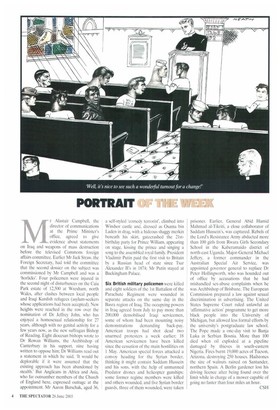PORTRAIT () 1 1 M r Alastair Campbell, the director of communications
at the Prime Minister's office, agreed to give evidence about statements on Iraq and weapons of mass destruction before the televised Commons foreign affairs committee. Earlier Mr Jack Straw, the Foreign Secretary, had told the committee that the second dossier on the subject was commissioned by Mr Campbell and was a torlicks'. Four policemen were injured in the second night of disturbances on the Caia Park estate of 12,500 at Wrexham, north Wales, after clashes between local people and Iraqi Kurdish refugees (asylum-seekers whose applications had been accepted). New heights were reached in the row over the nomination of Dr Jeffrey John, who has enjoyed a homosexual relationship for 27 years, although with no genital activity for a few years now, as the new suffragan Bishop of Reading. Eight diocesan bishops wrote to Dr Rowan Williams, the Archbishop of Canterbury in his support, nine having written to oppose him; Dr Williams read out a statement in which he said, 'It would be deplorable if it were assumed that the existing approach has been abandoned by stealth.' But Anglicans in Africa and Asia, who far outnumber members of the Church of England here, expressed outrage at the appointment. Mr Aaron Barschak, aged 36, a self-styled 'comedy terrorist', climbed into Windsor castle and, dressed as Osama bin Laden in drag, with a hideous shaggy merkin beneath his skirt, gatecrashed the 21stbirthday party for Prince William, appearing on stage, kissing the prince and singing a song to the assembled royal family. President Vladimir Putin paid the first visit to Britain by a Russian head of state since Tsar Alexander II's in 1874; Mr Putin stayed at Buckingham Palace.
Six British military policemen were killed and eight soldiers of the 1st Battalion of the Parachute Regiment were wounded in separate attacks on the same day in the Basra region of Iraq. The occupying powers in Iraq agreed from July to pay more than 200,000 demobilised Iraqi servicemen, some of whom had been mounting noisy demonstrations demanding back-pay. American troops had shot dead two unarmed protesters a week earlier; 18 American servicemen have been killed since the cessation of the main hostilities on 1 May. American special forces attacked a convoy heading for the Syrian border, thinking it might contain Saddam Hussein and his sons, with the help of unmanned Predator drones and helicopter gunships; some former regime members were killed and others wounded, and five Syrian border guards, three of them wounded, were taken
prisoner. Earlier, General Abid Hamid Mahmud al-Tikriti, a close collaborator of Saddam Hussein's, was captured. Rebels of the Lord's Resistance Army abducted more than 100 girls from Rwara Girls Secondary School in the Kaberamaido district of north-east Uganda. Major-General Michael Jeffery, a former commander in the Australian Special Air Service, was appointed governor general to replace Dr Peter Hollingworth, who was hounded out of office by accusations that he had mishandled sex-abuse complaints when he was Archbishop of Brisbane. The European Commission prepared a law against sexual discrimination in advertising. The United States Supreme Court ruled unlawful an 'affirmative action' programme to get more black people into the University of Michigan, but allowed less formal efforts by the university's postgraduate law school. The Pope made a one-day visit to Banja Luka in Serbian Bosnia. More than 100 died when oil exploded at a pipeline damaged by thieves in south-eastern Nigeria. Fires burnt 19,000 acres of Tucson, Arizona, destroying 250 houses. Hailstones the size of walnuts rained on Santander, northern Spain. A Berlin gardener lost his driving licence after being found over the limit while in charge of a mower capable of going no faster than four miles an hour.


































































 Previous page
Previous page